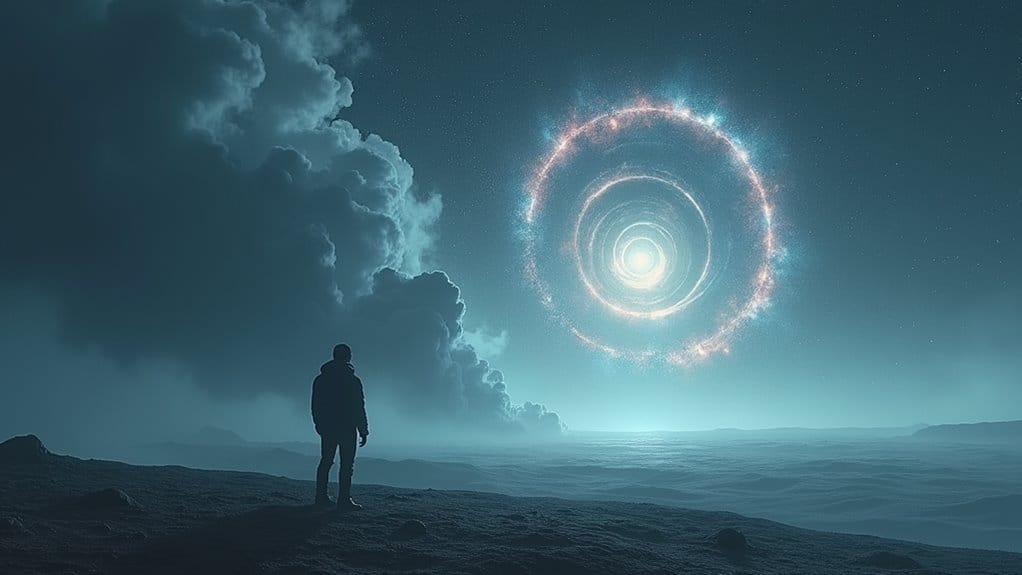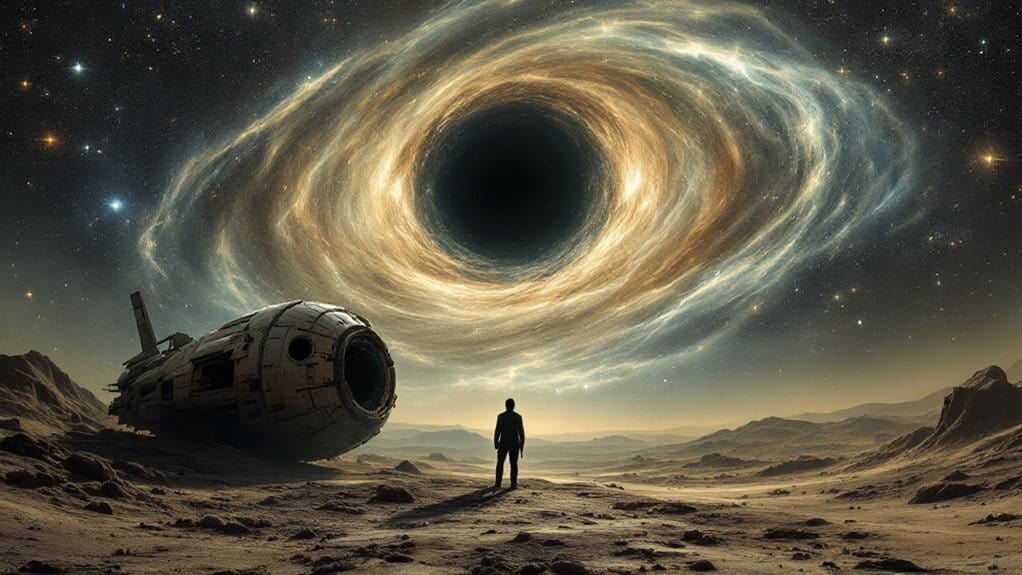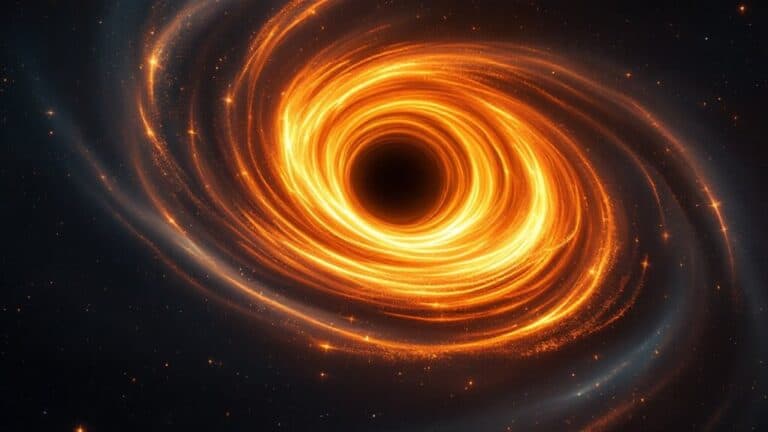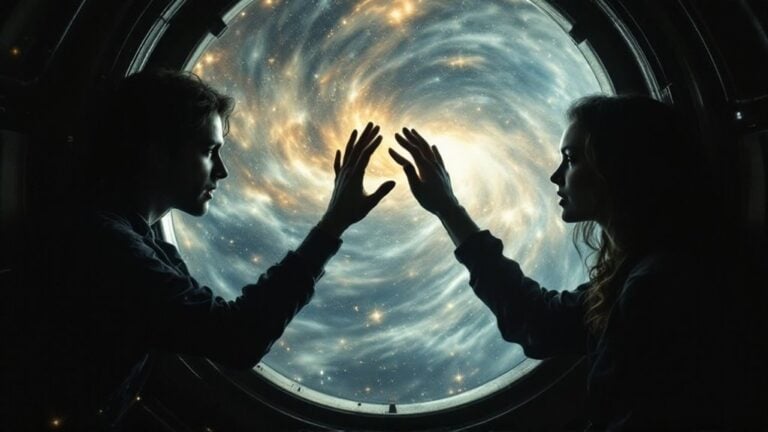Themes in Interstellar and Nolan’s Direction
In *Interstellar*, Nolan masterfully intertwines themes of hope, love, and isolation, showcasing human resilience in the face of cosmic challenges. You’ll feel the emotional weight of love as a driving force, transcending time and space, especially through Cooper’s sacrifices for Murph. The film’s exploration of isolation reveals its toll on the human psyche, testing both ethical boundaries and mental stability. Additionally, the struggle between good and evil plays out through moral dilemmas, emphasizing the complexity of human emotion. Nolan invites you to reflect on heritage and legacy, creating a tapestry that enriches your understanding of existence. Discover more as you explore these intricacies further.
Table of Contents
Key Takeaways
- “Interstellar” explores hope and salvation through human resilience amid cosmic challenges, highlighting the possibility of survival against impending doom.
- Love is depicted as a powerful, transcendent force that influences character decisions and connections across time and space.
- Isolation’s psychological impact is portrayed, showcasing how solitude affects mental health and strains relationships among characters.
- The film presents moral dilemmas that test character integrity, emphasizing the struggle between good actions and the temptations of evil.
- Themes of heritage and legacy are woven throughout, illustrating how love and human connections preserve family histories and influence future generations.
Hope and Salvation in Interstellar
Hope and salvation are central themes in *Interstellar*, driving the narrative and the characters’ journeys.
You see, the film emphasizes human resilience as characters venture into the cosmos, motivated by the impending doom of Earth. Their quest for a new home reflects a profound belief in the potential for survival through cosmic exploration. This journey not only underscores the need to leave Earth but also highlights the survival of the human race as a critical driving force behind their actions. Furthermore, much like in Nolan’s other works, the film explores the tension between illusion and harsh truths, showcasing how these themes can provide insight into human nature.
Yet, the film also balances this desire for transcendence with a deep-rooted connection to Earth, illustrating that hope isn’t solely about escape. Instead, it emerges from human efforts, showcasing how future humans intervene to guide the present.
While some might argue for divine salvation, *Interstellar* challenges you to reflect on how human ingenuity and determination can pave the way for a brighter future, even in the face of overwhelming odds.
The Power of Love

In *Interstellar*, love emerges as a powerful force that shapes the characters’ destinies and decisions. It transcends dimensions, connecting Cooper and Murph across time and space, illustrating how love can drive choices beyond mere logic.
Dr. Brand argues that love is more than an emotion; it’s an observable force that influences actions, like her decision to prioritize Edmund’s planet despite the risks. This connection is further emphasized by Cooper’s motivation to endure the isolation and loneliness of space travel, driven by his love for Murph.
You witness how Cooper’s love for Murph motivates him to make great sacrifices, reinforcing the idea that love can guide decision-making in profound ways. This theme resonates throughout the film, suggesting that love isn’t just a feeling but a fundamental aspect of human experience, intertwining with science to reveal a deeper understanding of existence. Additionally, the film incorporates complex scientific ideas that serve as a backdrop for exploring these emotional themes.
Isolation and Its Effects

While exploring the vastness of space, the characters in *Interstellar* confront profound isolation that tests their mental resilience and ethical boundaries. This isolation leads to significant behavioral changes and emotional turmoil, impacting their relationships deeply. You witness how isolation shapes their actions, often pushing them to abandon their moral principles.
Here are some key effects of isolation:
- Behavioral Changes: Characters display instinctual behaviors driven by survival.
- Mental Health Decline: Long periods alone, like Romilly’s 23 years, deteriorate mental well-being.
- Coping Mechanisms: To combat loneliness, they listen to familiar sounds from Earth.
- Relationship Strain: Isolation creates emotional distance, even among those physically present.
Additionally, the film illustrates how time dilation exacerbates their isolation, as moments spent away from loved ones stretch into years for those on Earth. The character of Dr. Mann exemplifies how isolation leads to mental deterioration, ultimately resulting in desperate and dangerous actions.
Through these themes, Nolan masterfully illustrates the profound impact of isolation on the human experience.
The Good vs. Evil Struggle

The struggle between good and evil permeates *Interstellar*, illustrating the complexities of human nature in extraordinary circumstances. Throughout the film, characters face moral dilemmas that challenge their integrity, showcasing how human actions can lead to both heroism and betrayal.
| Good Actions | Evil Actions |
|---|---|
| Cooper’s selfless sacrifice | Dr. Mann’s betrayal |
| Humility and love as guiding forces | Corruption born from pride |
| Maneuvering choices for survival | Choosing cowardice over bravery |
| Enduring hardship for the greater good | Intentional malice causing chaos |
| Relationships as moral compasses | Isolation leading to moral decay |
*Interstellar* emphasizes that evil arises from flaws in human nature, not the universe itself, reminding us of the delicate balance between light and darkness within us all. The film critiques the notion of finding a new habitable planet as a primary solution, suggesting a failure to address the root causes of climate change. As such, the narrative underscores the significance of human emotion in guiding decisions that affect both personal and cosmic destinies.
Heritage and Legacy Themes

Heritage and legacy intertwine in *Interstellar*, shaping the film’s exploration of human existence and our connection to the past. By weaving historical references and cultural symbolism throughout, Nolan encourages you to reflect on the importance of what’s come before.
Consider these key elements:
- Respect for the Past: The film honors classics like *2001: A Space Odyssey* and *Field of Dreams*.
- Influence of Historical Works: It draws from warnings by authors like Orwell, reminding you of the lessons history teaches.
- Cyclical Patterns: The film uses symbols like black holes to illustrate recurring themes.
- Sacrificial Love: Cooper’s journey highlights love’s power to transcend time and preserve family legacies.
These themes resonate, urging you to acknowledge your own heritage and its role in shaping the future.
Conclusion
In “Interstellar,” Nolan crafts a universe where human connection transcends time and space, much like a ship traversing uncharted waters, symbolizing our quest for meaning. The themes of hope, love, and legacy intertwine, urging us to reflect on our own journeys. As you ponder the characters’ struggles, consider your own relationships and the legacies you wish to leave behind. Ultimately, this film isn’t just about survival; it’s an invitation to embrace the profound connections that define our humanity.







